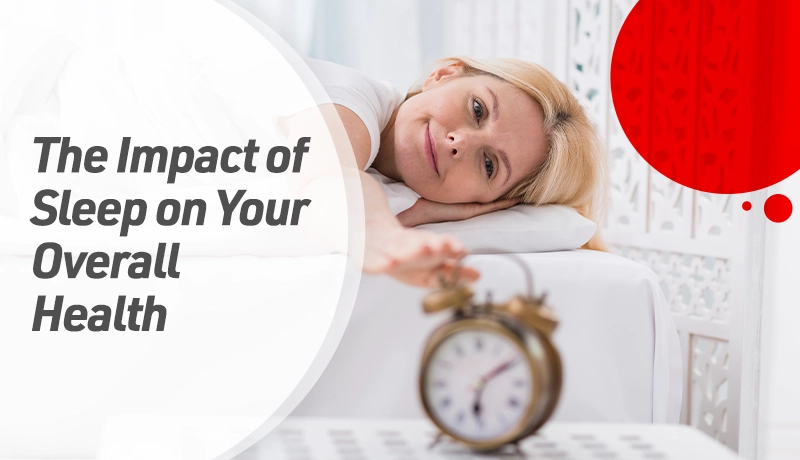A good night’s sleep is like hitting the reset button on your body and mind. Sleep isn’t just about closing your eyes and waiting for the alarm; it’s about giving your body the restorative energy it needs to thrive. This article will guide you through essential tips for improving sleep and achieving restorative health.
Table of Contents
Understanding the Importance of Sleep

Why Sleep Is Essential for Your Health
Sleep is not a luxury; it’s a necessity. During sleep, your body repairs cells, consolidates memories, and strengthens its immune defenses. It’s the secret ingredient behind physical endurance, emotional stability, and cognitive sharpness. Without it, everything from mood swings to chronic illnesses can emerge.
The Link Between Sleep and Mental Well-being
Ever felt like the world’s crumbling after a restless night? That’s your brain crying out for sleep. Adequate rest ensures neurotransmitters stay balanced, reducing stress, anxiety, and depression. Regular sleep rejuvenates your mind, leaving you sharp and emotionally resilient.
Effects of Sleep Deprivation on Your Body
Chronic sleep deprivation wreaks havoc on your body. It can lead to weight gain, heart disease, diabetes, and weakened immunity. Not to mention, it impairs your decision-making abilities and slows down reflexes—making it a significant risk factor for accidents.
Preparing for a Restful Night

The Role of a Consistent Sleep Schedule
Your body loves predictability. Going to bed and waking up at the same time daily trains your internal clock. Consistency helps regulate your circadian rhythm, ensuring you fall asleep faster and wake up feeling refreshed.
Creating a Sleep-Conducive Environment
A serene bedroom can make all the difference in the quality of your sleep.
- Lighting and Noise Control
Opt for dim, warm lighting in the evening and eliminate disruptive noises. Consider blackout curtains or a white noise machine for added comfort. - Ideal Room Temperature
Keep your bedroom cool, between 60–67°F (15–19°C), as it mimics the natural dip in body temperature during sleep, promoting deeper rest.
Importance of a Relaxing Bedtime Routine
An evening ritual can signal your body it’s time to wind down. Try reading, meditating, or soaking in a warm bath. Avoid stimulating activities like watching thrilling shows or scrolling through social media.
Additional Tips for Better Sleep and Restorative Health
Prioritizing Mental Clarity Before Bed
Mental clarity can significantly impact the quality of your sleep. Here are some strategies to declutter your mind before bedtime:
- Unplug from Overstimulation
The constant barrage of information from work emails, news, or social media can leave your mind overwhelmed. Set a specific “digital detox” time to disengage from these activities. - Establish Evening Boundaries
Clearly define the time to end your workday or responsibilities. Create a buffer zone for relaxing activities to ease your mind into rest mode. - Engage in Creative or Calming Hobbies
Knitting, sketching, or even light reading can help shift your focus from daily stressors, creating a smooth transition to sleep.
Natural Aids for Improved Sleep

Incorporating natural remedies can support your journey to restorative sleep:
Aromatherapy
Essential oils like lavender, chamomile, and eucalyptus are known for their calming properties. Diffusing them in your room or using them in a warm bath can promote relaxation.
Herbal Teas
Sipping on caffeine-free teas such as chamomile, valerian root, or lemon balm can soothe your nervous system and prepare your body for rest.
Supplements
Magnesium and melatonin are widely recognized for their sleep-promoting effects. However, always consult a healthcare professional before adding supplements to your routine.
Customizing Your Bedtime Ritual
Everyone’s body responds differently to pre-sleep routines. Customizing your bedtime ritual is essential:
- Experiment with Relaxation Techniques
Whether it’s deep breathing, meditation, or light stretching, find what works best for you. Yoga Nidra, a form of guided meditation, is particularly effective for inducing deep relaxation. - Include Gratitude Journaling
Reflecting on positive aspects of your day can shift your mindset, reducing nighttime anxiety and paving the way for peaceful sleep. - Pamper Yourself
Activities like skincare routines, aromatherapy massages, or a warm foot soak can signal your brain to wind down, enhancing the quality of your rest.
The Science of Morning Sunlight for Better Sleep

Believe it or not, morning routines are just as crucial for quality sleep as night time habits. Exposure to natural light early in the day:
- Resets Your Circadian Rhythm
Natural sunlight signals your body to produce daytime hormones like cortisol and suppress sleep-inducing ones like melatonin. - Enhances Mood and Energy
Regular morning sunlight exposure can prevent Seasonal Affective Disorder (SAD) and boost overall mental health. - Improves Sleep Efficiency
Studies have shown that individuals who get at least 30 minutes of sunlight exposure in the morning sleep better at night.
Understanding Your Body’s Sleep Stages
Good sleep isn’t just about duration; it’s also about cycling through the five stages of sleep effectively.
Stage 1 & 2: Light Sleep
These are transitional stages where your body begins to relax, and heart rate and breathing slow down.
Stage 3 & 4: Deep Sleep
This is the restorative phase, where your body repairs tissues, builds bone and muscle, and strengthens the immune system.
REM Sleep
Dreaming occurs during REM (Rapid Eye Movement) sleep, essential for cognitive functioning and emotional regulation.
Creating habits that promote uninterrupted cycles through these stages is key to waking up feeling refreshed.
Benefits of Long-Term Sleep Improvements

Investing in better sleep has compounding benefits over time:
- Enhanced Immune Function
Regular quality sleep strengthens your immune system, helping you fend off illnesses more effectively. - Improved Productivity
Sleep sharpens focus, memory, and decision-making skills, ensuring peak performance throughout the day. - Balanced Hormonal Health
Restful sleep regulates hormones like ghrelin and leptin, which control appetite, preventing weight gain and boosting metabolism.
Optimizing Your Sleep Hygiene

What Is Sleep Hygiene and Why It Matters
Sleep hygiene encompasses habits that promote quality sleep. It’s about making mindful choices throughout your day—like limiting caffeine and creating a calming pre-bedtime routine.
Limiting Screen Time Before Bed
Screens emit blue light, which tricks your brain into staying alert. Powering down devices at least an hour before bedtime can work wonders for sleep quality.
Balancing Diet and Sleep
What you eat impacts how well you sleep.
- Foods That Promote Better Sleep
Include bananas, almonds, or a small serving of dairy. These contain magnesium and tryptophan, which help produce sleep-inducing hormones. - Foods and Drinks to Avoid
Steer clear of caffeine, alcohol, and heavy meals close to bedtime. These disrupt your sleep cycle and leave you tossing and turning.
Dealing with Sleep Challenges
Identifying Common Sleep Disorders
Understanding sleep problems is the first step to overcoming them.
- Insomnia
Difficulty falling or staying asleep can be a symptom of stress, lifestyle factors, or health conditions. - Sleep Apnea
Interrupted breathing during sleep requires medical attention and often involves lifestyle changes or medical devices.
Strategies for Managing Stress and Anxiety
Stress and anxiety are common culprits of poor sleep. When your mind is racing, falling asleep can feel like an impossible task. However, managing these challenges effectively can transform your rest.
- Practice Relaxation Techniques
Deep breathing exercises, progressive muscle relaxation, and guided imagery can calm your mind. These methods reduce cortisol levels, allowing your body to transition into sleep mode. - Journaling Before Bed
Offload your thoughts by writing them down. It helps declutter your mind and provides clarity, making it easier to unwind. - Adopt Mindfulness and Meditation
Apps like Calm and Headspace offer guided meditations tailored for sleep. They train your mind to focus on the present moment, leaving stress and anxiety behind. - Limit Worry Time
Designate a specific time during the day to address concerns or create to-do lists. This helps you avoid ruminating over issues at bedtime.
When to Seek Professional Help
Sometimes, sleep struggles require intervention from a specialist. Here’s when you should consider reaching out:
- Persistent Sleep Problems
If sleep issues persist for more than a few weeks despite improving habits, consult a doctor. - Symptoms of Sleep Disorders
Signs like loud snoring, gasping for air, or prolonged insomnia may indicate underlying conditions such as sleep apnea or chronic insomnia. - Mental Health Challenges
Anxiety, depression, or PTSD often disrupt sleep. A mental health professional can offer therapy or medication to address the root causes.
Seeking professional help isn’t a sign of failure—it’s a proactive step toward better sleep and health.
Enhancing Sleep Quality for Long-Term Benefits
The Power of Regular Exercise
Exercise isn’t just good for your waistline; it’s a sleep enhancer too. Regular physical activity:
- Reduces stress and anxiety.
- Boosts energy levels during the day and promotes deeper sleep at night.
- Improves circadian rhythm by exposing you to natural light during outdoor workouts.
Timing is key—aim to finish vigorous workouts at least 3-4 hours before bedtime to avoid overstimulation.
Monitoring Sleep with Technology
Modern technology can be a double-edged sword, but it can also be a tool for improving sleep. Wearable devices like smartwatches and apps can:
- Track your sleep cycles, heart rate, and movements during the night.
- Identify patterns that affect your rest, such as interruptions or light sleep phases.
- Offer actionable insights, like bedtime recommendations and reminders.
Use this data as a guide, but don’t let it stress you out—focus on trends, not perfection.
Understanding the Role of Naps
Naps can be a game-changer when used strategically. Short power naps (20–30 minutes) can:
- Boost alertness and mood without interfering with nighttime sleep.
- Help make up for lost rest during particularly busy weeks.
However, avoid long or late-afternoon naps, as they can disrupt your sleep cycle and make it harder to fall asleep at night.
Final Recap
Better sleep isn’t just about what happens during the night; it’s a holistic journey involving lifestyle changes, consistent habits, and mental clarity. By prioritizing restful sleep, you’re gifting yourself better physical health, mental well-being, and a higher quality of life.
- Seek professional guidance when needed.
- Stick to a regular sleep schedule.
- Create a peaceful and sleep-conducive environment.
- Manage stress and practice relaxation techniques.
- Balance diet and exercise for optimal rest.
Frequently Asked Questions
1. What is the optimal number of hours to sleep for adults?
Most adults need 7–9 hours of sleep per night to function at their best. However, individual needs may vary based on age, activity level, and overall health.
2. How can I improve my sleep schedule naturally?
Stick to a consistent sleep-wake cycle, limit screen time before bed, and create a calming nighttime routine. Avoid caffeine and heavy meals late in the day for better results.
3. Are there specific exercises that enhance sleep quality?
Yes! Aerobic exercises like walking, jogging, and swimming, as well as yoga and stretching, are excellent for improving sleep. Engage in regular physical activity to support a healthy sleep cycle.
4. Can naps be counterproductive for good sleep?
Naps can be beneficial when kept short (20–30 minutes) and taken earlier in the day. Long or late naps may interfere with your ability to fall asleep at night.
5. What are the best natural remedies for better sleep?
Herbal teas (like chamomile), essential oils (such as lavender), and supplements like melatonin can help improve sleep. Always consult a healthcare provider before trying new remedies.







